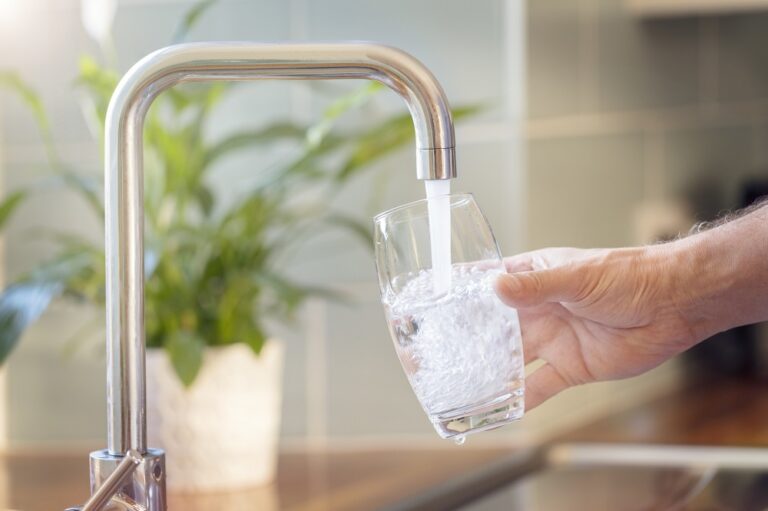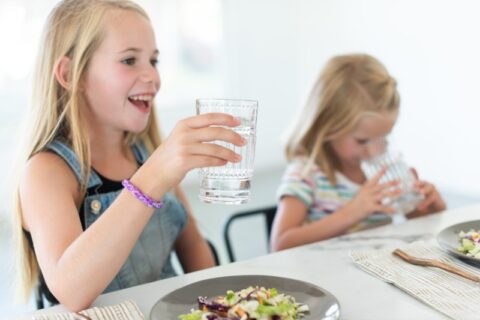Drinking Tucson Tap Water vs. Purified Water

You’ve heard it time and again—you should drink eight glasses of water every day to keep your body hydrated and functioning at its peak. But what many people overlook is the importance of drinking clean, healthy water. Is it okay to pour yourself a glass from the tap, or should you purify your water first?
Even though tap water is technically “purified” because it undergoes a treatment process, many contaminants still linger in your drinking water. This is especially true in Arizona, where the water quality isn’t that great. Fortunately, you have several methods for purifying your water at home to make it safer for your family.
Tap Water vs. Purified Water vs. Distilled Water
Tucson’s tap water is sourced from the Colorado River and 200 local groundwater wells. Water picks up many contaminants as it travels from these sites to your faucet, including microbes, salts, metals, chemicals, pesticides, and radioactive materials.
According to the City of Tucson’s 2020 Annual Water Quality Report, the groundwater delivered to residents’ homes meets drinking water standards without treatment. Still, to ensure the water remains free of microbial contamination, the city adds chlorine to the drinking water supply at wells, reservoirs, and other sites.
Water purification goes far beyond what the city does to treat tap water. Several methods may be used to purify water, including coagulation, sedimentation, filtration, and disinfection. Regardless of the method, purification aims to remove chemicals and contaminants that cause unhealthy or foul-tasting water.
Note that purified water retails some of its natural mineral content. This can actually make the water taste better without affecting its quality or safety.
Distilled water is a type of purified water that has had all chemicals, contaminants, and minerals removed. Distillation involves boiling water and collecting the steam for reuse, leaving you with pure H2O.
While some people choose to drink distilled water, it may not be as healthy as it sounds. Without a balanced diet, drinking distilled water could lead to micronutrient deficiency. For this reason, distilled water is usually reserved for use in medical procedures and portable humidifiers.
Is Tucson Tap Water Safe to Drink?
Tucson adheres to the Safe Drinking Water Act to ensure the city’s tap water is safe for public consumption. Having said this, several contaminants still hide in your tap water. Here are some of the issues outlined in the water quality report:
- PFAS: Perfluoroalkyl and polyfluoroalkyl substances (PFAS) are a group of synthetic chemicals used in industrial and consumer products since the 1950s. PFAS in drinking water reached 30 parts per trillion (ppt) in 2020. While the EPA recommends no more than 70 ppt, the Agency for Toxic Substances and Disease Registry recommends no more than 18 ppt.
- Arsenic: The highest arsenic concentration found in Tucson’s water in 2020 was 7.6 parts per billion (ppb). The maximum allowed level is 10 ppb.
- Nitrate: Water quality test results show nitrate levels between 0.25 and 6.41 parts per million (ppm), which can spike quickly due to fertilizer runoff, leaching from septic tanks, and erosion of natural deposits. The maximum allowed nitrate level is 10 ppm.
- Chlorine and DBPs: While chlorine is a critical disinfection agent, it can affect the taste and smell of your water and may cause health problems. Chlorine also produces disinfection byproducts (DBPs). The annual average for 2020 was 0.89 ppm, which can spike in the summer. The maximum allowed DBP level is 4 ppm.
- Water hardness: Hard water isn’t necessarily harmful, but excessive mineral content can clog your pipes, leave behind unsightly scale buildup, and make your skin feel dry and irritated. Water is considered “hard” at 7.0 to 10.5 grains per gallon (gpg). Anything over 10.5 gpg is “very hard.” Tucson’s drinking water has a total hardness of about 12.0 gpg.
How to Filter Your Tap Water at Home
After discovering the problems with your local drinking water, you may no longer feel comfortable drinking from the tap. Or maybe you just don’t like the taste. Fortunately, you don’t have to resort to buying expensive bottled water to keep you and your family safe. Here are four ways to filter your water at home, depending on the contaminants you want to remove:
- Whole-house filtration removes chlorine, sulfur, and other unwanted chemicals using activated carbon.
- UV light purification kills microbes in the water using concentrated ultraviolet energy.
- Water softeners remove excessive minerals using ion exchange.
- Reverse osmosis filters out sediment, chlorine, and dissolved solids using progressively finer semi-permeable membranes.
Kinetico Quality Water can install a whole-home water filtration system in your home. Our options include water softeners, dechlorinators, purifiers, and more. With our help, your family will enjoy cleaner, safer, better-tasting tap water. For more information about choosing a water purifier for your Tucson home, please contact us at 520-428-5497.


